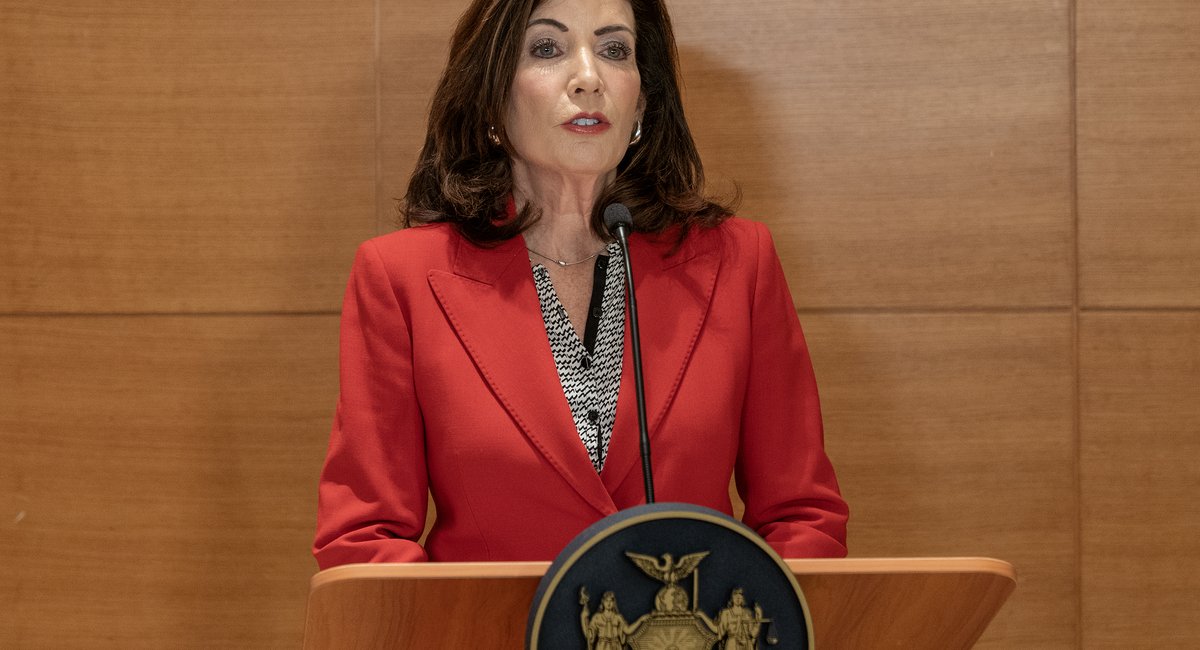As 2023 draws to a close, 1,595 incarcerated New Yorkers have asked Gov. Kathy Hochul to grant them clemency, according to her spokesperson Maggie Halley.
Since taking office, Hochul has granted a handful of people incarcerated in state prisons the gift of freedom every December in a holiday tradition of sorts.
In 2021, Hochul promised to grant clemencies more than just once a year, but didn’t grant any extra during her first year in office, leaving advocates disappointed. She granted 10 clemencies on Christmas Eve in 2021, and this time last year, she granted clemency to 13 people out of more than 1,200 applicants.
She granted seven clemencies in April this year, followed by another 13 in September for a total of 43 during her term so far.
Still, advocates for incarcerated people say they’d like to see her do it more often – and not just over the winter holidays. They say the chance at freedom gives incarcerated people an incentive to behave well and rehabilitate themselves. They also cite research that shows older people are less likely to commit crimes.
“I’ve been disappointed with the scale of her clemency actions,” said Lawrence Hausman of the Legal Aid Society’s Criminal Appeals Bureau. “I just think that the governor’s pardon power, which is an awesome power, could really be used to address the history of over incarceration.”
Halley, Hochul’s spokesperson, said the governor has taken a number of steps while in office to make the clemency process easier and more transparent, including launching an updated online web portal to help applicants.
“While we cannot comment on pending clemency applications as the process is confidential, Gov. Hochul is committed to improving justice, fairness and safety in the criminal justice system, and we are reviewing applications in that context,” she said.
At a Dec. 4 rally for clemency outside Hochul’s Manhattan office, more than a dozen protesters called on the governor to use her clemency power more generously.
The requests Hochul is reviewing include 1,139 requests for commutations, which shorten a sentence but allow a conviction to stand, and 456 requests for pardons, which do away with a conviction altogether.
As they held photos of incarcerated loved ones, the protesters chanted, “Hochul, Hochul, set them free, ‘tis the season for clemency.”
These are some of Legal Aid’s clemency candidates this year:
- Darr Wiliams has gained his GED, a college degree and almost a decade of experience educating on the risks of HIV and AIDS since he was first incarcerated at age 20. Now 53, he is one of nine people who has filed an application for clemency with the help of the Legal Aid Society Criminal Appeals Bureau. Williams was sent to prison 32 years ago for his role in a fatal double shooting, said Hausman. In that time he has mentored thousands of at-risk youth, educated himself, shown deep remorse for the harm he’s caused and now deserves to be freed, so he can give back to his community and two kids. “He’s really had a remarkable transformation,” Hausman said.
- Victor Clemente, 69, was charged with second-degree murder in 1986 for killing his neighbor during an argument. The case was initially dismissed in 1988 and Clemente moved to California, where he had a family and worked in health care for 18 years, until he was fingerprinted at work and learned the case had been appealed. He’s been in prison for the last 17 years where he has been a chaplain, practiced horticulture and maintained close contact with his family, Hausman said. He said Clemente is emblematic of those who are growing old in prison, and are missed by their families and communities.
- Michael Williams is currently serving a 20-year sentence for drug possession and sale. The crimes occurred on two days in 2010 when Williams was a young man, Hausman said, and he’s taken full responsibility for his actions over the past decade and would like to return to his family.
- Rudy Roa committed a 1992 robbery in Manhattan that turned fatal, killing a man and injuring a woman. For the past 30 years, Roa has spent his time in prison processing the trauma of his childhood and striving to become a better person, Hausman said. At the time of the robbery, Roa was 20 years old and struggling to provide for his wife and two young children, and takes full responsibility for his actions that night, Hausman said.
The cases Legal Aid has put forward include both those of older New Yorkers who have reformed during their decades in prison, and people who were given overly long sentences as teenagers or young men, Hausman said.
“The toll of overincarceration is not just on individuals in prison, but it’s also on their families and their communities,” he added.

Leave a Reply